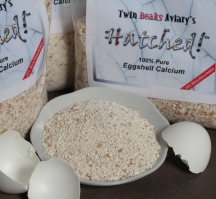The TWFA Diet – In order to keep any animal in their healthiest condition, it is vital to replicate their natural diet that they would seek in the wild. With Finches this is especially important. Very often common issues of health both mentally and physically can be corrected through improving the Finch’s diet. It is especially important for breeders who put a constant stress on their pairs by allowing them to reproduce. Every element of what I feed my flock is important to preserving their lives and the lives of their babies, and keeps them the happy and gorgeous birds I have always been blessed to keep.
(I do not feed my birds pellets and would never recommend doing so because of the health risks associated with them. Read about them in this article from the International Parrotlet Society.)
Do They Really Need All That Extra.. ??
Hobbyists have been breeding and keeping birds for hundreds of years and without a lot of the items I use or have listed here. That is great and works for them, this is what has worked for me in the best of ways. I’ve tried multiple products from independent stores, chain stores and home-made mixes recommended by other hobbyists over the years and one thing remained true.. The avian veterinarian-formulated products give the absolute best results. My birds went from lean to hardy, infertile to fertile, fertile to very fertile and my babies fledge with vibrant colors and great body builds. But don’t get me wrong! They still enjoy natural herbs, fruits, vegetables and hobbyist-home-grown remedies – but their nutrient foundation remains the same.
But don’t just take my word for it of course! Everyone should do their own research and decide what is best for their birds and life style. Here are a few articles on the subject:
- “An Ounce of Prevention” by Laraine @ LG
- “Avian Supplements Tested” by Mark Heron, posted @ LG
- “When Only the Best Will Do” (about Dr. Marshall) by Joanne @ LGF
- “Why Supplements?” by Joanne @ LGF
All products I have listed are on hand and available for free sampling or purchase at Lady Gouldian.
Also Note: A seed-only diet is harmful to a Finch’s health and can lead to issues such as vitamin deficiencies.
Where To?
Seed
Greens
Grit
Additional Organic Foods
Soft Foods
Insects
Additional Calcium
Fertility

Seed – The foundation of all Finches’ diets. The best options are well-balanced, fresh or live mixes that are specifically created for Finches. The seed you find in pet stores and grocery stores is often times stale or includes seeds or other items that finicky Finches don’t like, so I would recommend using an online retailer such as Lady Gouldian.
All of my Finches are fed an incredibly diverse diet. The foundation of which is their seed mix – Laraine’s Finch-specific hand-picked seed mix from LG. Every seed in the mix is devoured and I would feed them nothing less. This mix as everything else in their diet differs during the breeding or resting seasons. I also provide them with fresh California spray millet on a constant basis. This millet is great for sprouting, but I also use both white and black sprouting mixes as well which contain a wide array of seed that is not included in their regular mix.
The easiest way to test the freshness of your Finch’s seed mix is to try to sprout it. This is also called the “sprout test.” Here is a link to a detailed sprout recipe from the Finch Information Center. Sprouted seeds are especially great for breeding pairs and young Finches, but adults also benefit from the additional protein and nutrients found in sprouts.
I use Laraine’s seed mix from LG.
Greens – Greens are typically grasses such as Alfalfa or other plants that Finches would normally find in the wild. They are also a main staple for their basic diet. Organic soft food green mixes are great substitutes for Finches raised in captivity, the best of which being Herb Salad from Twin Beaks Aviary. These mixes of herbs and other plants allow birds to pick what they need at the time they need it. Some are medicinal, others repel pests, and all are healthy additions to any bird diet.
“Herb Salad’s 100% Organic ingredients are the leaves, roots, bark and flowers of the plants that animals in the wild seek as a means to obtain required nutrients, minerals, vitamins and healing capabilities. It differs from food and water additives such as vitamins and medications in the manner that it allows your birds to choose what it is they require and in what amount, when and if their diet needs supplementing. Herb Salad’s 22 medicinal herbs address common health issues safely and without the dangers that improper medicating and over supplementing can produce.”
I use Herb Salad from LG.
 Grit – In the wild, grit is used to aid in digestion. It can range from anything like sand or oyster shells to plain dirt. Grit also provides birds with minerals. I use a grit replacement called F-Vite. It not only fulfills their need for grit in their diet, it also provides protein, energy, vitamin and mineral supplements. My birds eat it daily as if it’s a treat in itself.
Grit – In the wild, grit is used to aid in digestion. It can range from anything like sand or oyster shells to plain dirt. Grit also provides birds with minerals. I use a grit replacement called F-Vite. It not only fulfills their need for grit in their diet, it also provides protein, energy, vitamin and mineral supplements. My birds eat it daily as if it’s a treat in itself.
Be careful when choosing a grit mix, and don’t use Charcoal – it negatively affects the absorption of some vitamins (A, B2 & K) and can lead to deficiencies. To read more about the negative effects of providing grit incorrectly to your birds, visit this article from Birds N Ways.
“F-Vite – sterile, concentrated Calcium, vitamin and mineral source used to replace grit, cuttlebone and salt blocks. Especially beneficial for breeding and young molting birds.”
Additional Organic Foods – I provide my flock with organic foods that not only improve their overall health, but also aid in fertility, help parents better prepare for the breeding season and help babies develop. One of these organic foods is bee pollen – which is a better protein source than eggs and includes a wide array of nutrients. My flock also enjoys a kelp mix which aids in fertility, and egg shells to provide an extra Calcium boost.
A Few Words About Bee Pollen – “Bee Pollen has been called ‘The World’s First Health Food’ because its healing powers were first described in the Bible and ancient Chinese and Egyptian texts. Bee Pollen contains nearly every known nutrient required for a balanced human diet. Bee Pollen is approximately 25% Protein, 50% carbohydrates and 14% polyunsaturated beneficial fatty acids. It is rich in natural hormones, carotenoids, flavonoids and phytosterols. In addition, bee pollen has more than a dozen vitamins, 28 minerals, 11 enzymes or co-enzymes and 18 amino acids.”
I use Bee Pollen, Kelp Mix and Hatched! from LG.
 Softfoods – I use an egg-based meal from LG or homemade egg softfood mix that gives birds the added protein and calcium they need. I also regularly provide them with sprouted seed and an insect softfood, which are other natural sources of protein and vitamins. My flock also has access to an oily seed mix that helps boost their energy when they’re feeding chicks or mating.
Softfoods – I use an egg-based meal from LG or homemade egg softfood mix that gives birds the added protein and calcium they need. I also regularly provide them with sprouted seed and an insect softfood, which are other natural sources of protein and vitamins. My flock also has access to an oily seed mix that helps boost their energy when they’re feeding chicks or mating.
I use Egg Meal, California Spray Millet, Live Niger Seed, Black Sprouting Mix, White Sprouting Mix and Insectivore Softfood from LG.
Insects – It’s important to supply Finches with the natural proteins they seek in the wild in the form of insects, especially during the breeding season while raising young. It’s part of their daily routine and diet, along with most other birds. Many people use Mealworms, but personally I am not a fan of live or even frozen/freeze-dried bugs. I don’t want them in my home at all! So I choose another option, to feed my birds an insect softfood mix that they eat probably more than anything else I supply them with. In this softfood mix are a number of organic and home-grown bugs which are exactly what you’d want for your birds with no preservatives or other additives. The mix I use also includes other nutrients and herbs for my flock to forage through.
I use Insectivore Softfood from LG.
Additional Calcium – To prevent all of the Calcium-deficiency problems common with breeding Finches, I provide my birds with a wide array of additional Calcium sources in both treat and supplement form. The basis for their Calcium intake begins in their water, with either a breeding season or resting season supplement.
During the resting season and for non-breeding birds, I provide a Calcium-rich vitamin supplement. This is to provide an extra boost when they are not ingesting their breeding season vitamin supplements which also contain Calcium. There are multiple foods in their diet that also provide Calcium that they pick and eat from on a daily basis: egg shells, egg meal, Cuttlefish Bone, etc. that each Finch can pick and choose from. Between both their food items and supplements I have never had any Calcium issues in my flock. They take what they need as they need it and it is up to me to provide it constantly so they are able to pick and choose.
Make sure you are balancing your birds’ Calcium intake properly, and do not give them too much at one time which can be harmful to them. I do not give my birds both Ioford & Calcium Plus at the same time because they both contain large amounts of calcium. I alternate each supplement at different times in their breeding cycle and lifetime when necessary. Be sure to follow all product instructions carefully.
I use a Cuttlefish Bone, Calcium Plus, Hatched! and Miracle Meal from LG.
Fertility – I use natural and vitamin supplements that are very safe and effective much like I do with the Calcium needs of my flock. Kelp Mix is made from Norwegian kelp and birds love to pick through it as needed. They don’t even notice the supplements in their water, it makes it very easy for me to ensure their health.
Iodine (which aides in fertility) is very harmful when distributed improperly or too often. Be sure to use only one Iodine-rich supplement at a time and follow product directions.














